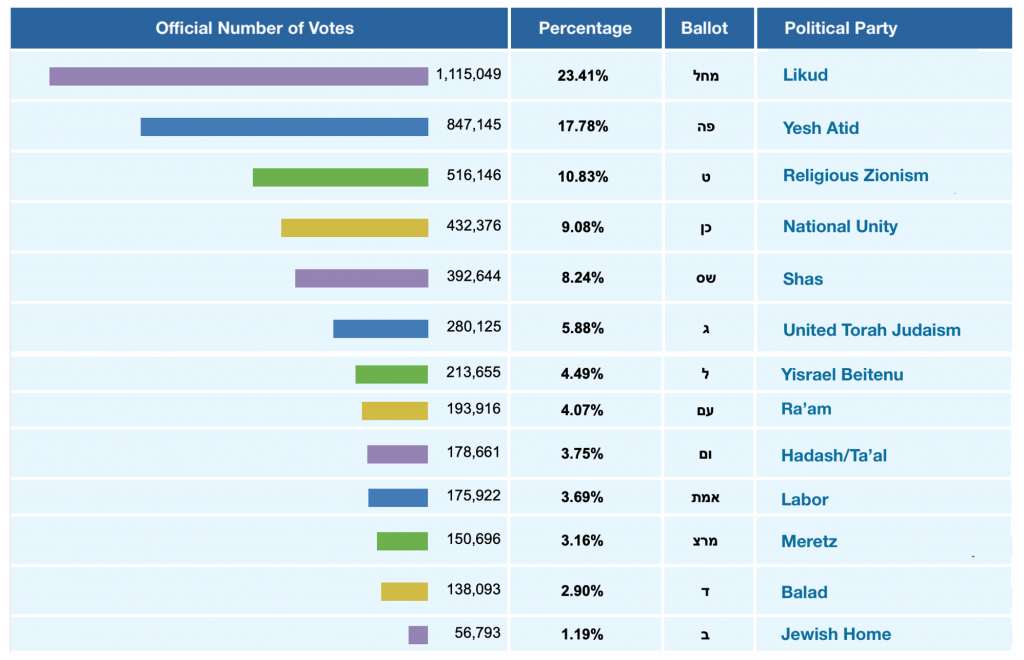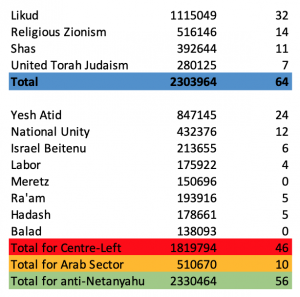FRESH AIR
In Israel’s election, wasted votes were PM Lapid bloc’s undoing
November 4, 2022 | Ahron Shapiro

With the announcement late on November 3 of the final vote count for Israel’s November 1 national election, Israeli Opposition Leader Binyamin Netanyahu’s Likud-led right-wing bloc is poised to form the next government with a commanding 64-seat majority of right-wing and religious parties in the 120-seat Knesset, while outgoing Prime Minister Yair Lapid’s centre-left bloc was left with only 46 seats, with two non-Zionist parties oriented towards the interests Israel’s Arab minority holding the remaining ten seats.
Yet despite the lopsided allocation of seats in favour Netanyahu’s bloc, the popular vote was actually almost evenly split between the right and left camps. In fact, when you include the votes that went to the three non-Zionist parties supported by Arab voters – parties mutually incompatible with any right-wing government that has a far-right element – the pro-Netanyahu camp received just 30,293 more votes. That’s a difference of just 0.63% of the popular vote.
You read that right. The right-wing pro-Netanyahu bloc of Likud (1,115,049), Religious Zionism (516,146), Shas (392,644, United Torah Judaism (280,125) and Jewish Home (56,793) received 2,360,757 total votes, or 49.56% of the popular vote of 4,763,694.
Meanwhile, Yesh Atid (847,145), the National Unity party (432,376), Yisrael Beitenu (213,655), the Joint List (193,916), Hadash/Ta’al (178,661) Labor (175,992), Meretz (150,696) Ra’am (193,916) and Balad (138,093) garnered 2,330,464 votes, or 48.93%.
(The number does not equal 100% since I’m leaving out the 1.51% of the votes that went to a smattering of tiny niche parties that had no chance to pass the threshold, and the 0.63% of votes that were thrown out as invalid.)

How is it, with the popular vote so close, that the number of Knesset seats allocated were so different?
The simple answer is that many more votes for the anti-Netanyahu bloc were wasted on parties that did not get over the 3.25% electoral threshold, especially the left-wing party Meretz party and the vehemently anti-Zionist Arab nationalist party Balad.
Meanwhile neither Balad, Ra’am nor the Joint List – parties that had successfully run together on the Joint List ticket in the past despite their vast political differences – forged vote sharing agreements for surplus votes. Such arrangements could almost certainly have helped these parties wring out the maximum number of seats between them.
Fractured centre-left had no viable path to a new coalition
There was no right-wing landslide afoot, but an efficient campaign strategy by Netanyahu to concentrate right-wing and religious votes – Likud’s so-called natural partners – into just four parties (squashing out a fifth, Ayelet Shaked’s Jewish Home party, even at the cost of wasting a few votes). Meanwhile, the centre-left was relying on seven or eight parties to enter the Knesset in order to merely block Netanyahu from forming a government.
It was doubtful that Lapid could form a government after the election always because none of the Arab parties besides Ra’am had said they would support a Lapid government, even from the outside.
As the Jerusalem Post’s Lahav Harkov, a Knesset reporter for most of her career, reflected in a tweet on November 3, “I long thought that the choice in this election was between Bibi and another election.”
In an op-ed on November 3, Ha’aretz columnist Uri Misgav summed up the mistakes that the centre-left camp made to contribute to the fall of the unity government and the failed campaign leading up to the election loss. Among them are Labor leader Merav Michael’s ill-fated decision not to run together with Meretz and recent comments of two members of the communist Hadash party defending Palestinian terrorism.
The mistake of Labor and the Joint List to run alone and without running together with Meretz and Balad, respectively, transformed what could have been a very close finish between parties allied for and against Netanyahu into a romp and strong comeback for Israel’s longest serving prime minister, in spite of his ongoing court cases on corruption charges.
RELATED ARTICLES

US Middle East strategy amid regional instability: Dana Stroul at the Sydney Institute

Antisemitism in Australia after the Bondi Massacre: Arsen Ostrovsky at the Sydney Institute





















